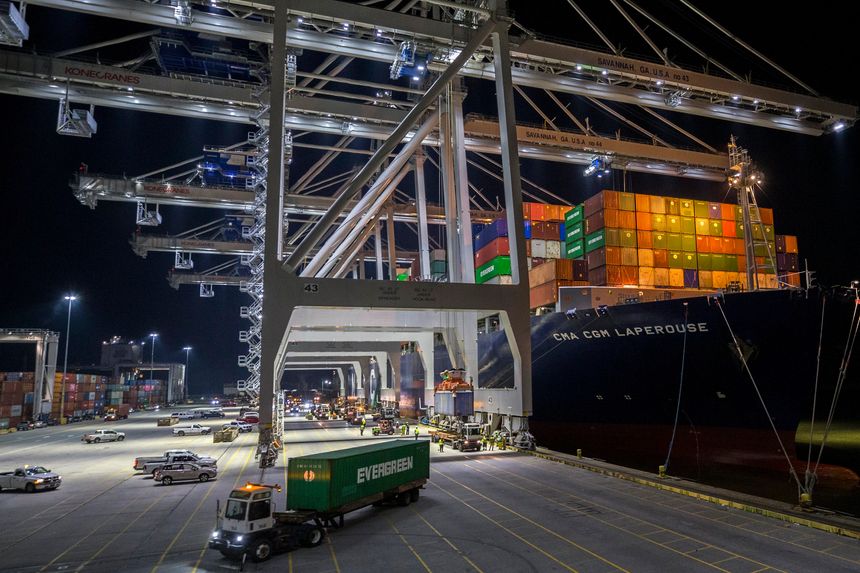A backup of container ships off one of the U.S. East Coast’s busiest ports has swelled to 40 vessels, reviving a bottleneck that had cleared earlier this year and raising fresh concerns over potential supply-chain disruptions during the critical peak shipping season.
Officials at Georgia’s Port of Savannah, the fourth-largest U.S. gateway for seaborne container imports, said the delays in getting ships to berths resumed in recent weeks as shipping volumes accelerated after an earlier backlog that topped out at about 30 ships was cut back to nothing this spring.
“We’ve more than doubled the demand that we had in prepandemic on the import side,” said Griff Lynch, executive director of the Georgia Ports Authority, which operates the Savannah port. “That is driving some congestion on the berthing side.”
Mr. Lynch said the demand has been surging earlier than usual this year because some major retailers moved up their back-to-school and holiday imports to beat ongoing supply-chain challenges.
The backup at Savannah, which handled some 2.9 million containers last year, is the latest sign that congestion at U.S. seaports is persisting even as authorities from Southern California to New York are trying to speed up the flow of boxes and keep goods moving.
The pandemic-fueled retail boom has led to a surge of imports since last year, leaving logistics operations at sea and on land scrambling to keep up.
A backlog of vessels at the California ports of Los Angeles and Long Beach, the largest U.S. container import complex, that peaked at 109 vessels in January has receded to between 20 and 24 vessels on most days, and dipped as low as 17 ships earlier this week, according to the Marine Exchange of Southern California.
But importers still face lengthy delays in moving goods by rail out of the Southern California ports, and backups have cropped up at sites including Savannah and the Port of New York and New Jersey as shippers have sought to find alternative routes into U.S. markets.
The Georgia Port Authority cleared the earlier backup, which it said was triggered by insufficient yard capacity to hold containers, by accelerating a $34 million expansion of the port’s container storage capacity.
Now, said Mr. Lynch, “We have one of our berths under construction. Had we had that berth completed, or if it wasn’t under construction, we wouldn’t have anything near this backlog.” The construction will be finished in 2023, he said.
The Port of Charleston in South Carolina, about 100 miles north of Savannah, said it has no congestion after coping with a backup earlier this year.
“Given the number of vessels off the East Coast and the sustained influx of imports, we are using this time to prepare for the likelihood of more ships calling on the Port of Charleston soon,” said Barbara Melvin, chief executive of the South Carolina Ports Authority.
In Savannah, Mr. Lynch said import demand could slip if retailers pull back orders because they are weighed down by excess inventories as inflation pressures cut into consumer spending.
“We don’t see that dropping off a cliff per se,” he said. “But I do think we see a slowdown coming towards the end of this calendar year or the beginning of the new year because of the inflationary impacts that we’re all experiencing.”
Source: Hellenic Shipping News






